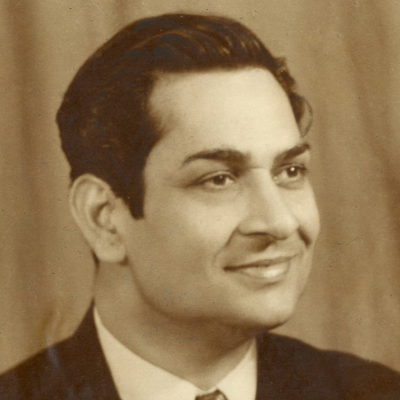Keki Adajania
Subscribe to read full article
This section is for paid subscribers only. Our subscription is only $37/- for one full year.
You get unlimited access to all paid section and features on the website with this subscription.
Not ready for a full subscription?
You can access this article for $2 , and have it saved to your account for one year.
- Primary Cinema: Hindi
Leading actor Keki Adajania—also credited as Kaiskushru Adajania or K Adajania—was active in the early years of Indian cinema and is known for his work in films such as Nala Damayanti (1920), Themuras & Themuljee (1921), Veer Babruwahan (1934), and Tara Sundari (1934). Working with leading studios such as J F Madan’s film production company Madan Theatres initially followed by an extensive innings with Chandulal Shah’s Ranjit Studios, he featured in approximately 17 films in the course of his career that lasted around two decades.
Among the earliest films he worked in was the big-budget silent mythological Nala Damayanti (1920). Produced by Madan Theatres and directed by Eugenio DeLiguoro, it was a cinematic adaptation of a play based on an episode from the Mahabharata well known to Indian audiences. The story, which pits humans against the gods, showcased spectacular special effects, which constituted one of the main advertising arguments of the film upon its release. Adajania essayed the lead role of King Nala, paired opposite Patience Cooper who played Damayanti. The film, produced with only the resources that Madan Theatres could afford at the time, is considered technically superior to anything previously made in India.
Next, he starred in Madan Theatres’ comedy film Themuras & Themuljee/ Aflatoon (1921), written by Phirozshah 'Pijam' Marzban, featuring alongside Master Bhrigu and Master Mohen.
Bhishma (1922), based on the life of the great warrior, saw him star in this mythological directed by Jyotish Bannerjee.
In the mythological sound hit Devi Devayani (1931), Adajania played the role of the renowned sage Shukracharya in this Chandulal Shah directorial that starred Gohar Jan, Kamlabai Gokhale and Dinshaw Billimoria. The film depicted the cosmic battle between the gods and the demons which reaches a stalemate when the sage Shukracharya (Adajania) instantly restores every fallen demon to life. God Indra (Baburao), on advice from Brahaspati (Vyas), sends Kacha (Bhagwandas) to the sage to learn his magic secret. Shukracharya's daughter, Devayani (Gohar) likes Kacha and the latter is accepted as the sage's disciple. The demon Vrisha Parva (Thatte) tries to kill Kacha but the youth is rescued by Devayani until the demons succeed in dissolving Kacha's body in alcohol and make Shukracharya drink the brew. Shukracharya then teaches Kacha the secret chant so that when he dies and Kacha emerges from his stomach, Kacha may bring him back to life again.
He went on to feature in films such as Gayabe Garud/ Black Eagle (1931) directed by Harilal M Bhatt, Bhutio Mahal (1932) directed by Jayant Desai, Jayant Desai’s Char Chakram (1932), and Ranjit Films’ Radha Rani (1932), a melodrama about a free-spirited bucolic maiden crushed by society and circumstance. The same year, he also acted in Chandulal Shah’s Sati Savitri (1932), a mythological film based on the Mahabharata which depicted the tale of how Savitri saves her husband Satyavan from the clutches of Yama, the god of death.
Ranjit Movietone’s Bhool Bhulaiya (1933) saw him feature in the Jayant Desai-directed comedy alongside Ghori, Dixit and Kamlabai Ghokhale.
Krishna Sudama (1933) featured him alongside Ram Apte, M Bhagwandas and others in the mythological directed by Jayant Desai for Ranjit Movietone, Bombay.
He played the character Seth Kisandas in the crime drama Miss 1933 directed by Chandulal Shah, starring Gohar Jan. The film was a classic modernisation melodrama exploring the consequences of female autonomy. Kusum (Gohar) rejects her avaricious uncle's decision to marry/sell her to a rich man. She is adopted by Seth Kisandas (Adajania), and meets his urbanised son Jayant (E Bilimoria) and his friends Ramesh (Yakub) and Kishori (Mehtab). The love story of Kusum and Jayant explores the complications ensuing from a woman's freedom to choose. When she defends herself when Ramesh molests her, she is tried for attempted murder.
The mythological Veer Babruwahan (1934), directed by Jayant Desai, featured him as Arjuna, the father of Babruwahan (Bilimoria), who fights heroically in the Mahabharata war and returns to his mother who despairs at the strife between her son and her husband.
Chandulal Shah’s Toofani Taruni (1934) alongside Gohar Jan and Eddie Billimoria, the drama genre film Tara Sundari (1934) directed by Chandulal Shah, and the Wajahat Mirza-directed Swaminath (1942) are among the other films that Adajania acted in.
-
Filmography (5)
SortRole
-
Swaminath 1942
-
Bhishma 1922
-
Nala Damayanti 1920
-









.jpg)



